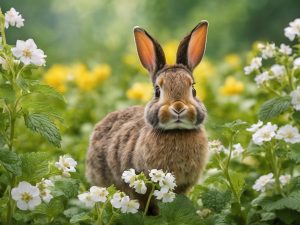Can Rabbits Eat Lemon Balm Flowers? Nutritional Benefits, Diet & Serving Tips
What Are Lemon Balm Flowers?
Lemon

Alternative Names
Lemon Balm is known by various names worldwide, including Melissa, Sweet Melissa, Bee Balm, and Honey Plant. No matter what you call it, this herb has a lot to offer.
Can Rabbits Eat Lemon Balm Flowers?
The good news for rabbit owners is that Lemon Balm flowers are generally safe for our furry friends to munch on. In fact, many rabbits seem to enjoy the taste and aroma of these blossoms. However, as with any new
Quantity to Eat
When it comes to feeding Lemon Balm flowers to your rabbit, moderation is key. These flowers are more of a treat than a staple in a rabbit’s diet. Offer them sparingly, and don’t let your bunny go overboard.
The Benefits of Lemon Balm Flowers
Lemon Balm flowers come with a handful of potential benefits for your rabbit:
-
Vitamin Boost
These flowers are rich in vitamins A and C, which are crucial for your rabbit’s overall health. Vitamin A helps maintain good eyesight, while vitamin C supports their immune system.
-
Digestive Aid
Lemon Balm contains fiber, which can aid in digestion and keep your bunny’s gut healthy. It’s like a gentle broom for their tummy.
-
Calming Effects
Lemon Balm is known for its soothing properties. Some rabbits may find its aroma calming, which can be especially helpful during stressful situations.
Can Pet Rabbits Eat Lemon Balm Flowers?
| Feature | Description | References |
|---|---|---|
| Pet | Rabbit | |
| Food | Lemon Balm flowers | |
| Toxicity | Safe for rabbits to eat | [1][2] |
| Nutritional Value | Rich in vitamins and minerals | [3][4] |
| Serving size | Small amounts as occasional treats | [5] |
References:
- https://www.rabbitwelfare.co.uk/resources/content/info-sheets/safe-food/
- https://www.therabbithouse.com/diet/rabbit-food.aspx
- https://www.thesprucepets.com/can-rabbits-eat-herbs-1238879
- https://www.rabbitcaretips.com/can-rabbits-eat-lemon-balm/
- https://www.rabbitsonline.net/threads/can-rabbits-eat-lemon-balm.84623/
Cautions and Warnings
While Lemon Balm flowers offer benefits, there are a few precautions to keep in mind:
-
Pesticides
Ensure that the Lemon Balm flowers you provide are free from pesticides or chemicals. Organic sources are the safest bet.
-
Moderation
Just like with any treat, don’t go overboard with Lemon Balm flowers. Too many can lead to digestive issues. Keep it as an occasional treat.
-
Allergies
Rabbits can have sensitivities to certain foods. If you notice any unusual reactions after introducing Lemon Balm flowers, discontinue feeding them.
Similar or Alternative Foods
If you’re looking to diversify your rabbit’s diet or want to explore alternatives to Lemon Balm flowers, consider the following options:
-
Herbs
like , cilantro, and can be a flavorful and aromatic addition to your rabbit’s meals. -
Edible Flowers
Dandelions, marigolds, and pansies are edible flowers that rabbits often enjoy. They add color and flavor to their diet.
-
Fruits
Occasional small servings of
like slices, , or can satisfy your rabbit’s sweet tooth. Remember to offer fruits in moderation due to their sugar content.
Serving Lemon Balm Flowers Right
If you decide to offer Lemon Balm flowers to your rabbit, here are some serving tips:
-
Freshness Matters
Always provide fresh Lemon Balm flowers. Wilted or spoiled blossoms won’t be appealing to your bunny.
-
Rinse Thoroughly
Before serving, rinse the flowers under cold
to remove any dirt, pesticides, or contaminants. Gently pat them dry with a paper towel. -
Small Portions
Offer small portions of Lemon Balm flowers at a time. A few blossoms are enough to introduce the flavor and nutrients.
In conclusion, Lemon Balm flowers can be a fragrant and nutritious treat for your rabbit when offered in moderation. Prioritize their well-being by ensuring the flowers are fresh and free from pesticides. Keep an eye on your bunny’s response when introducing new foods, and consult your veterinarian if you have any concerns about their diet.
So, the next time you’re harvesting Lemon Balm from your garden, consider sharing a few of those aromatic blossoms with your furry companion. It’s a simple way to add a touch of zest and health to their lives! 🐰🌼







Leave a Reply